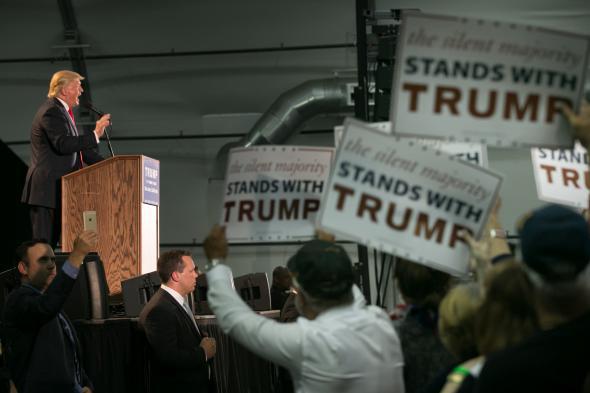Good news for those of us who live in fear of the words President Donald J. Trump: The latest batch of polling suggests that the presumptive Republican nominee is losing ground to Hillary Clinton, becoming even more unpopular among key demographic groups, and—perhaps most telling of all—facing a potential backlash to his hate-filled, xenophobic response to this past weekend’s mass shooting in Orlando, Florida.
The caveats: General election polling this far out from November tells us far more about the present than it does the future. Clinton has her own serious popularity problem to deal with. And the public’s reaction to this past weekend’s domestic terror attack could still change as we learn more about it. But, even with those disclaimers, the numbers suggest that at this particular moment in time, Trump is in trouble.
Consider a new CBS News poll out Wednesday, which asked Americans how they felt about Trump, Clinton, and President Obama’s respective responses to the Orlando attack, which was the worst mass shooting in U.S. history: 44 percent of Americans approved of Obama’s response, while 34 percent disapproved (net: plus-10); 36 percent approved of Clinton’s response, while 34 percent disapproved (net: plus-2); and 25 percent approved of Trump’s response, while 51 percent disapproved (net: minus-26).
The survey spanned only two days—Monday and Tuesday—but the results suggest that Americans prefer their presidential hopefuls to actually act presidential in the wake of a national tragedy as opposed to acting like, well, Trump. That’s particularly important given a terror attack on domestic soil is often cited as something that might help Trump overcome the many other electoral factors that favor Clinton. The early returns instead suggest that his authoritarian-style fearmongering is unlikely to benefit him in the general election the same way it did in the Republican primary.
While it will take time for post-Orlando feelings to settle, a handful of other recent polls suggest the presumptive GOP nominee was trending down before this past weekend. A Bloomberg survey released Tuesday showed Clinton with a 12-point lead on Trump in a three-way race that also included Libertarian Party nominee Gary Johnson, who got 9 percent. (Clinton’s lead in that survey was actually down from where it was the last time those same pollsters asked about a hypothetical head-to-head matchup in March, but that was before Trump got a bump from securing the GOP nomination.) The new Bloomberg survey marked the first time Clinton was up by double-digits on Trump in a major poll since the start of last month.
Meanwhile, the latest RealClearPolitics rolling average has Clinton leading Trump, 44.1 percent to 38.6 percent. As National Review points out, in the three most recent presidential elections, no nominee of a major party ever averaged less than 40 percent at any point in an election year. Trump dipped below that mark last week for the first time since he became his party’s presumptive nominee last month.
Trump and Clinton remain the least popular major presidential candidates in modern history, so to that degree, we’re still in uncharted territory. But Clinton’s dismal favorability ratings are largely holding steady while Trump’s even-more-dismal scores continue to fall as he finds new ways to alienate large swaths of the country. He is currently doing that by demonizing Muslim Americans; he did it before by suggesting that an American-born judge was biased because of his Mexican heritage; he’ll do it again.
Trump wants his voters to see the world through an Us vs. Them lens, but he continues to define an increasing number of Americans as the latter. It’s not a shock, then, that in a new Washington Post/ABC News poll out Wednesday, 88 percent of nonwhites and 77 percent of women said they had an unfavorable view of Trump. (The poll was conducted over a five-day stretch ending this past Sunday.) More surprising—and heartening—is that Trump is also becoming less popular among those groups that he’s trying to rile up with his nativist bluster. His net-favorable rating in the survey was minus-20 among whites, minus-26 among men, and minus-36 among those who never attended college. As the Post’s Greg Sargent points out, one of the only subsets that viewed Trump favorably in the poll is noncollege white men, and even their opinions are mixed, with 52 percent saying they have a positive view and 46 percent saying the opposite.
A lot will happen between now and November. But the limited evidence we do have suggests that Trump’s decision to pivot even further to the right—as opposed to the center, as his campaign had promised Republicans he would do after locking up the nomination—isn’t just hurting him among the GOP establishment. It’s hurting him with the people who matter most: the voters.
